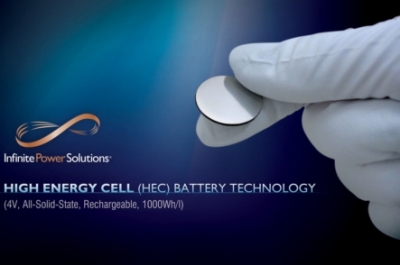Oct 19 2012
Infinite Power Solutions, Inc. (IPS), a U.S. clean-technology company and global leader in manufacturing solid-state, rechargeable batteries, today announced the development of a new all-solid-state rechargeable battery technology with low manufacturing costs and record energy density.
 New 4V solid-state battery technology Achieves Record energy density >1,000Wh/l. Photo Courtesy Of Infinite Power Solutions. (PRNewsFoto/Infinite Power Solutions)
New 4V solid-state battery technology Achieves Record energy density >1,000Wh/l. Photo Courtesy Of Infinite Power Solutions. (PRNewsFoto/Infinite Power Solutions)
The innovative High Energy Cell (HEC) technology features a 4V rechargeable chemistry that delivers high power, an ultra-low self-discharge rate and long life for permanent battery implementations. This ceramic-based HEC technology uses only low cost, high throughput, non-vacuum manufacturing processes, which is fundamentally different from the solid-state, thin-film batteries currently produced by IPS. The new HEC technology offers much higher cell capacity than existing thin-film technology, yet remains inherently safe and eco-friendly. This technology enables a new era of low cost, high capacity, small form-factor, rechargeable batteries in traditional battery formats such as coin cells, or custom shapes and sizes to serve medical, industrial and consumer electronics.
The unique HEC technology offers a fully packaged volumetric energy density of greater than 1,000Wh/l, which is unprecedented for a 4V rechargeable chemistry, especially when packaged in form factors that are smaller and thinner than today's coin cells. As a figure of merit, HEC technology can produce a single cell capacity of 85mAh per charge cycle in a 20mm diameter round cell ~1mm thick. Such a cell exhibits a continuous current capability of 30mA and a peak pulse current of up to 90mA at 25°C. With a similar 3-cell stack connected in parallel and packaged within a traditional 20mm diameter metal package like a coin cell, a capacity of 250mAh per charge cycle can be achieved within a 3.2mm standard thickness, while delivering an impressive 270mA of pulse current at 25°C. For comparison, a standard 3V primary (non-rechargeable) CR2032 LiMnO2 coin cell has a lifetime capacity of only 220mAh and a peak pulse current of up to 75mA. Though less common, 3.6V rechargeable coin cells are available today, but provide substantially less capacity and power than the aforementioned primary cell. Therefore, the HEC technology developed by IPS offers much higher lifetime energy and much more power than conventional coin cells available today.
All-solid-state HEC technology delivers about 70-percent (700Wh/l) of the rated capacity at a current density of 1mA/cm2, which is comparable to the continuous current density of a conventional lithium ion (Li-ion) prismatic battery with energy densities of only 400-500Wh/l. Employing the HEC technology into a tiny, fully encapsulated, 4.8mm round cell with only 1.0mm thickness delivers ~3mAh of capacity at a continuous current of ~35µA and can provide a pulse current of ~3mA at 25°C. This is a strong capacity-current capability for many real-time clock (RTC) and memory backup power applications, and offers 5 times more energy density and 5 times more power than existing ML414 cells using Li/MnO2 chemistry.
Dr. Bernd Neudecker, Chief Technology Officer at IPS and inventor of the HEC technology, commented, "Our new 4V, solid-state, rechargeable HEC battery technology is truly unique in the battery industry and offers industry leading energy density and performance." He further stated, "I am pleased with the extraordinary achievements of our R&D team, which has exceeded my expectations and surpassed the achievements of the global 4V rechargeable battery community."
Dr. Neudecker and his research team are continuing optimization of the HEC technology at the company's R&D and battery manufacturing facility in Littleton, Colo. Standard products that leverage this new technology are expected to be available by 2014. Meanwhile, IPS has an existing line of all-solid-state battery products in production, such as its award-winning THINERGY® Micro-Energy Cell (MEC) product family of 4V, rechargeable, thin-film batteries with >100,000 recharge cycles.